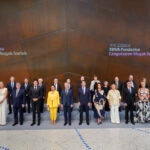The Frontiers Awards champion the power of knowledge as the best guide for addressing global challenges
Carlos Torres Vila emphasized the power of research, innovation and education to tackle the great challenges facing humanity, such as the COVID-19 pandemic and the environmental deterioration, during his speech at the 14th BBVA Foundation Frontiers of Knowledge Awards ceremony.

We are living in an “era of disruption,” said the BBVA Chair, and “when we face challenges that transcend not only geographical borders, but also the limits of our knowledge, we need to articulate a global and coordinated response based on research, innovation and education.”
During the ceremony held at the Euskalduna Conference Center in Bilbao, which honored the contributions of 14 world leaders in scientific research and artistic creation, Carlos Torres Vila recalled how “when we had not yet recovered from the COVID-19 crisis, we were shaken by the invasion of Ukraine” and warned about “the seriousness of climate change and the loss of biodiversity, both of which are probably among the greatest disruptions in history.” The COVID-19 vaccines have shown that, in the face of such challenges, the key to success is “knowledge generated through international collaboration.”

Since its creation 15 years ago, the fundamental objective of the Frontiers of Knowledge Awards is to promote “rigorous and validated knowledge” as “the best compass and the best instrument we have to understand the world and ourselves,” and therefore “to face the great challenges of our time,” concluded the BBVA Chair.
“Science is powerful and offers us the opportunity to design a more supportive, fair and sustainable future,” said the president of the Spanish National Research Council (CSIC), Rosa Menéndez, who co-presided over a ceremony in which the President of the Basque Government, Íñigo Urkullu, and the Mayor of Bilbao, Juan Mari Aburto, also took part.
This year's honorees include the creators of messenger RNA technologies that enabled the development of vaccines against the COVID-19 pandemic in record time, researchers who have made fundamental advances in combating climate change and biodiversity loss, cutting-edge mathematicians who have enabled significant progress in quantum physics, the pioneers of artificial intelligence, and economists who have shown how relationships and social networks influence a person's career path, income level or financial dependence.
All the winners of the 14th Edition of the Frontiers of Knowledge Awards
The BBVA Foundation Frontiers of Knowledge Awards, offering €400,000 in each category, were created in 2008 with the aim of recognizing and rewarding contributions of singular impact, especially those that significantly expand the scope of knowledge, give rise to new fields or are the result of interaction between different disciplinary areas, in different fields of science, art and the humanities.
- In its 14th edition, mathematicians Charles Fefferman and Jean-François Le Gall were the winners in the Basic Sciences category, for having opened up new perspectives in mathematical analysis and probability theory.
- In Biology and Biomedicine, the winners were Katalin Karikó, Robert Langer and Drew Weissman for creating the two technologies that together have advanced messenger RNA therapies, making the development of vaccines against COVID-19 and other infections, as well as new treatments for multiple diseases, possible.
- Judea Pearl is the recipient of the award in the Information and Communication Technologies category, for laying the foundations of modern artificial intelligence that allows computers to manage uncertainty and relate causes to effects.
- The Ecology and Conservation Biology category acknowledged Lenore Fahrig, Simon Levin and Steward Pickett for introducing the spatial dimension into ecological science and applying it to the design of more sustainable nature reserves and cities.
- The husband and wife team of glaciologists Ellen Mosley-Thompson and Lonnie Thompson received an award in the Climate Change category, for demonstrating through their studies of glacier ice that the rapidity of current global warming is unprecedented.
- Matthew Jackson was acknowledged in the Economics, Finance and Business Management category for his pioneering work that has shed new light on the role of networks in economic and social life.
- In the Humanities and Social Sciences category - which alternates annually between these two domains, this time being dedicated to the Social Sciences - the award went to economist Mark Granovetter, for discovering the importance of the extended network of ‘acquaintances’ for economic and social life.
- Last but not least, in Music and Opera, composer Philip Glass was credited with creating a unique musical style that combines cultural traditions from around the world and reaches a wide audience of different generations.